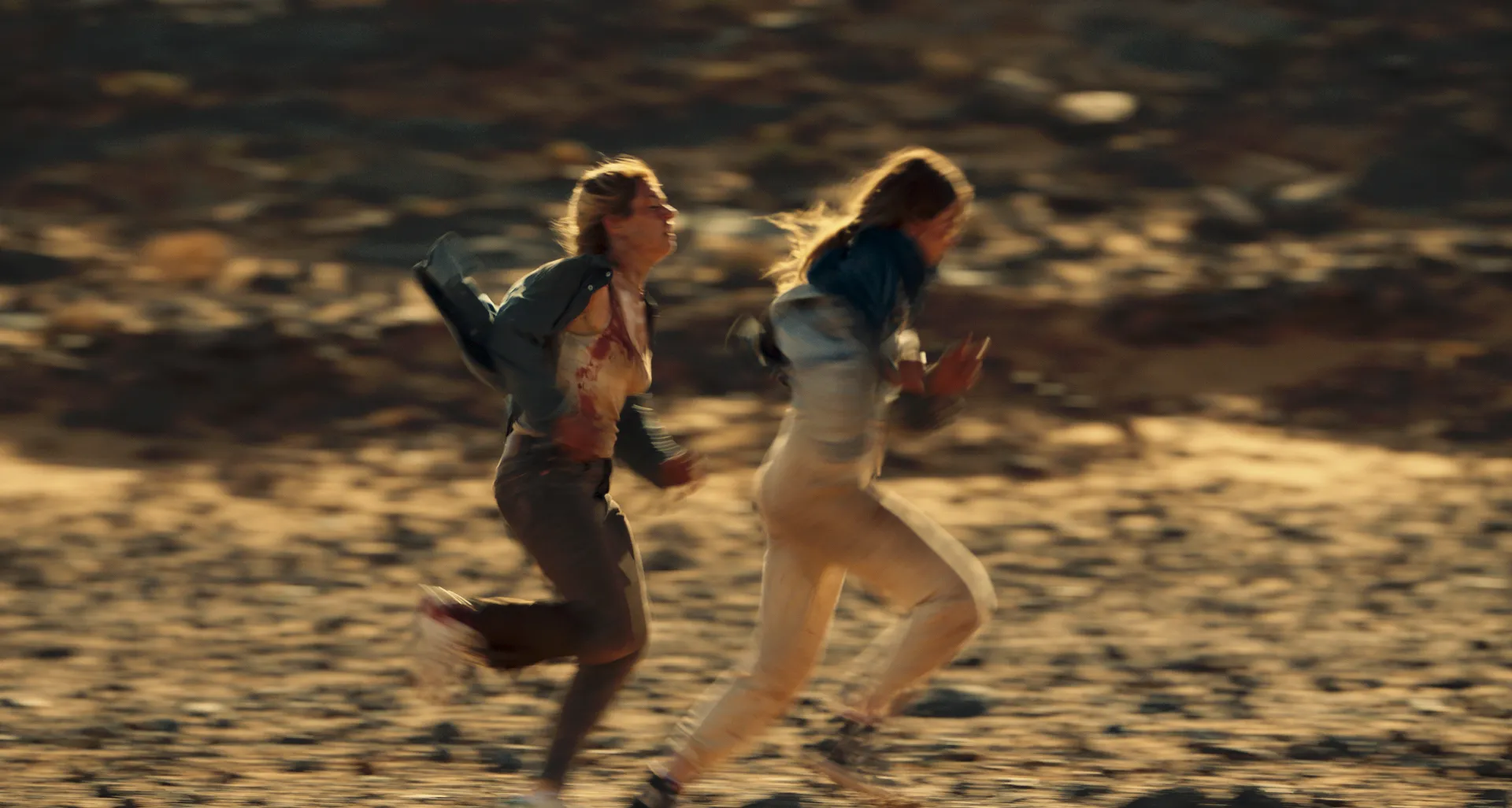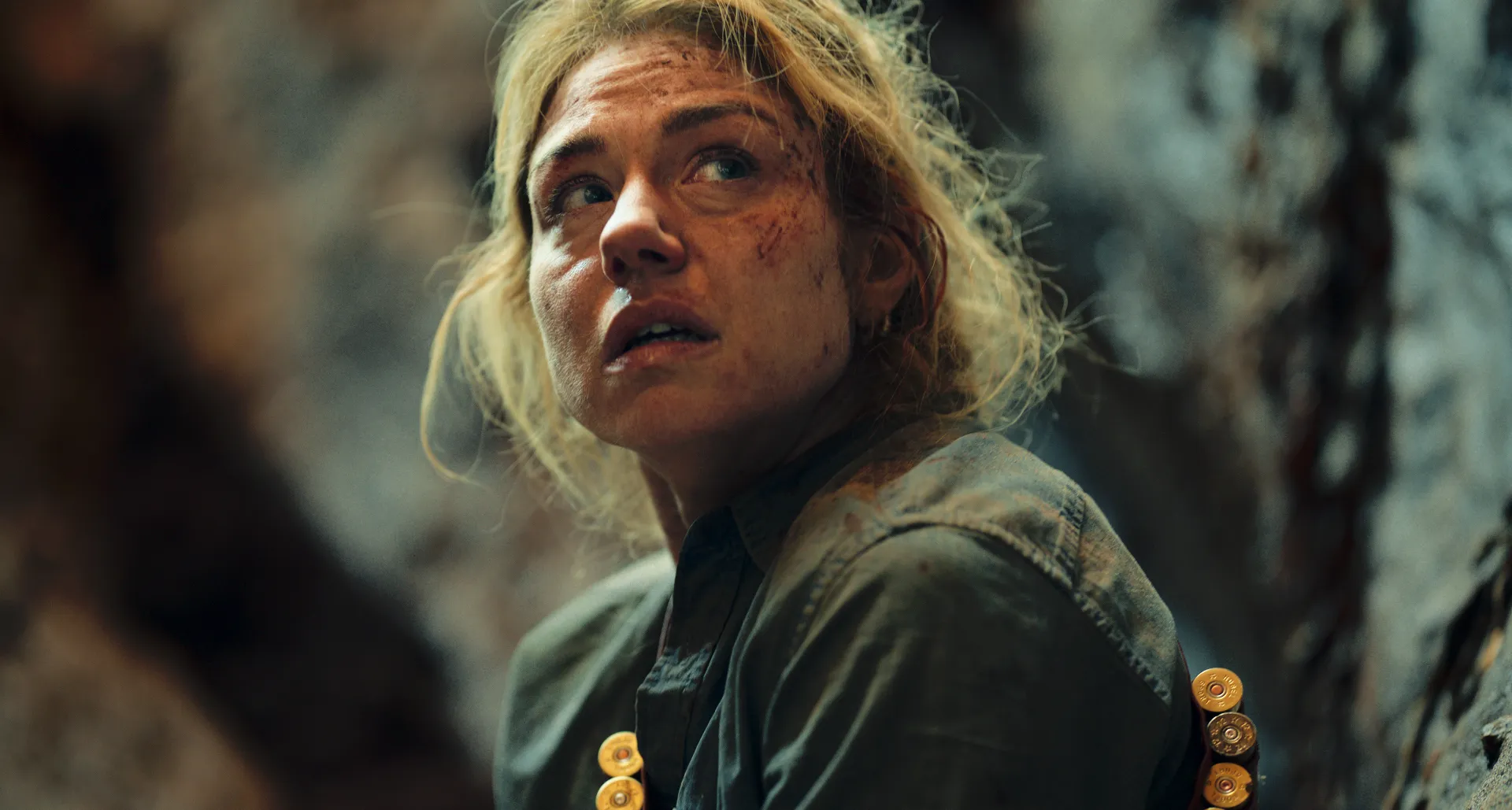Survive wastes little time thrusting its main characters into turmoil. As the film begins, German oceanographer Tom, his French doctor wife Julia, and their two American children Cassie and Ben set sail in the Caribbean for a birthday celebration. But strange waves and wildlife behaviors hint that all is not well on the high seas.
The family’s boat is soon damaged, leaving them stranded when a colossal storm strikes. What follows is every eco-disaster enthusiast’s wildest nightmare come to life.
The storm’s intensity stems from a crisis far beyond any normal weather pattern. Director Frédéric Jardin presents a stunning and scientifically speculative vision—the Earth’s magnetic poles abruptly flip positions. As satellite imagery foreshadows, this reversal will exchange the world’s arrangements of land and sea completely.
When the tempest subsides, the family awakens to a new kind of horror. Where azure Caribbean waters once lapped is now a barren seascape stretching as far as the eye can see. The oceans have vacated, draining into the dry basins that were continents.
Struggling to comprehend their position in this startling new environment, the family must band together through the trauma. Their pressing goal is locating Captain Nao’s submarine for potential shelter before the magnetic poles reverse again. However, traveling across the former seabed proves treacherous, with numerous perils emerging from the deep.
Between a psychopathic threat, ravenous arthropods evolved to hunt on land, and uncertain human encounters, the family is pushed to its limits. Through it all, Jardin spotlights their emotional dynamics, ensuring Survive balances spectacle and survival action with grounded human drama.
A Perilous Journey Across Uncharted Waters
The film wastes little time thrusting the main characters into danger. German oceanographer Tom, his French doctor wife Julia, and their American children Cassie and Ben embark on their yacht cruise in the Caribbean to celebrate Ben’s upcoming birthday. But strange currents and unusual wildlife behaviors hint that all is not right below the surface.
Their boat soon suffers damage, leaving them stranded just as a colossal storm strikes. What unfolds is every disaster aficionado’s nightmare—director Frédéric Jardin presents a scientifically speculative vision of an abrupt magnetic pole reversal. Satellites fall from the sky as oceans drain into the continents turned desert.
The family awakens to a frightening new reality. Vast, dry seabeds now stretch endlessly across the landscape. As they struggle to comprehend their position, a single goal drives them—locating Captain Nao’s submarine before the poles flip again. This stranded vessel could offer sanctuary if they reach it in time.
Traversing the difficult former ocean terrain proves perilous. They face a psychopath intent on harm, other survivors value only self-preservation, and sea creatures evolved to hunt on land. Through trauma and loss, the family bands together on their urgent cross-country journey.
Further trials emerge as arthropods with a taste for human flesh. Narrowly escaping danger at every turn, the family perseveres across the challenging terrain. But with the magnetic shift looming, can they find the submarine shelter before the waters engulf them once more? A desperate race for survival in a world transformed leaves their fate hanging in the balance.
Visual Majesty Among the Dunes
Director Jardin faces immense challenges bringing this spectacle to life on a shoestring budget. Yet the film proves him more than up to the task with its remarkably dramatic visuals. The vast sun-baked Moroccan desert stands in for the dried seabed, transporting viewers to this new world in singular fashion.
As the family traverses these sandy expanses once home to marine life, Jardin crafts meticulous suspense. He utilizes Morocco’s sweeping landscapes to their fullest, escalating tension through compositional mastery. CGI enhances key moments judiciously despite limitations. The arthropods evolve an eerie realism that startles.
Cinematographer Aïm captures the grandeur with artistry, lending imagery a grittiness befitting the family’s struggle. References to western flavor sequences traversing the barren “seas.” Their journey through this wilderness acquires the dust-worn flair of classic frontier films.
Nicolas Errèra’s score also elevates atmosphere. As the family confronts terrors within this vast emptiness, his music infuses each discovery with portent. Melodies toll like sinister heartbeats, evoking the primal forces that now hold sway.
Through visual prowess, Jardin brings this singular bleak realm to stunning life. His landscapes immerse viewers in the family’s isolation against looming uncertainty.
Striving for Survival in a New World
In any disaster film, we endure the chaos through the eyes of compelling characters. In Survive, the lead actors skillfully draw us into the family’s battle for survival.
Émilie Dequenne owns the screen as the resolute mother Julia. Faced with losing all she holds dear, Dequenne infuses her with a raw intensity that engrosses us in her struggle. Lisa Delamar likewise immerses us as the rebellious teen Cassie confronts maturity beyond her years.
As the young son Ben, Lucas Ebel evolves from boyish adventure seeker to resilient survivor. His natural performance anchors us in Ben’s coming of age. Opposite the father Tom, Andreas Pietschmann balances strength and vulnerability.
Together, this core unit anchors Survive’s kinetic action in intimacy. We feel their terror and bonds as no mere archetypes, but a true family we urgently will survive.
At times the director could better support dramatic beats needing space to blossom. Yet within this brutal setting, the actors blossom. They elevate Survive from spectacle by making us care deeply who makes it out alive.
Even amid the film’s flaws, this cast ensures we cannot look away from their transformed world. Their sincere bonds and will to survive ignite the film’s heart.
Braving the Absurd for a Bold Environmental Vision
Balancing family drama with survival action poses challenges, though Jardin’s efforts shine through. His premise embraces bold absurdity, conjuring a fantastical “what if” to spark discussion on humanity’s environmental impact.
Of course, contriving sudden pole reversal strains credibility. And some conveniences, like the enigmatic psychopath, feel tacked on. Yet within this world, the familial drama resonates due to committed performances.
The director takes risks to underscore ecologically themed warnings. By draining the seas so viscerally, he highlights normally unseen issues like pollution wherever cameras roll. It’s a maximized metaphor for rising tides of climate change bearing down.
While random elements like the murderer undermine plot credibility, Jardin maintains suspense and adventure through the family’s desperate dilemma. Scenes traversing the surreal terrain grip us in their survival.
Ultimately, this ambitious French genre experiment deserves credit for stirring imaginings on humanity’s relationship with the natural order. The aims feel noble if execution falters at points. But by prioritizing his provocative visions, Jardin starts meaningful discussions.
His narrative swings for thought-provoking fences, lending French disaster cinema a bolder voice. The trade-offs seem a fair price for art willing to address pressing issues creatively through a visceral spectacle.
Crafting Thrills on a Shoestring
Despite constraints, Jardin’s technical skills breathe suspense into Survive. Grizzly practical effects shock for so modest a budget, immortalizing trauma through gritty realism.
While CGI animals feel less grounded, the arthropods evolve eerily. Their stop-motion scurrying surpasses expectations for an indie film. Skilled editing similarly rises above financial limitations.
Jardin knits tension across the tale’s brief span through masterful shot composition. Each discovery emerges chillingly between cuts. As the family battles through this bizarre new world, experienced pacing grips us from start to spectacular finish.
Nicolas Errèra’s score proves vital too, its strokes of menace the beating heart of anxiety and isolation. Melodies evoke both the horrors stalking within Survive’s sands and wider terrors plaguing our planet.
Most remarkably, committed performances elevate Survive above any shortcomings. Faced with unthinkable plights, this cast inspires our care through raw emotional resonance. Their brilliance anchors even Survival’s most unbelievable sequences in empathy.
Through technical artistry surpassing its wallet, Jardin crafts an eco-thriller genuinely difficult to tear away from.
Bold Visions of Family Resilience Against Catastrophe
With Survive, Jardin crafts an eco-thriller that enthralls through its driven characters navigating dystopia. While some story beats fall flat, the director’s ambitious spectacle engages far more than it exasperates.
This French genre experiment deserves praise for prioritizing provocative questions over formulaic plot points. By draining the seas so viscerally, Jardin highlights grave issues too easily ignored. And through a gritty family saga, he finds humanity amongst the absurd.
Purists dismissing certain scientific liberties or inconsistent beats miss the film’s noble aim—stirring imaginations on humanity’s environmental impact. It’s an admirable risk for independent cinema to take.
This wild ride won’t satisfy all. But open-minded genre fans seeking fresh international fare and those welcoming bold ecological metaphors will find Survive exhilarating. Its big swings make for a memorable French alternative, bringing disaster drama to life with heart.
Ultimately, Jardin’s film survives on raw performances and visionary visuals that immerse viewers in a family’s desperate quest. It’s a creative work compelling us to ponder life’s fragility against nature’s unpredictable wrath.
The Review
Survive
Survive stands out from the disaster movie pack through sheer ambition. With limited resources, director Jardin crafts a gripping saga of familial resilience through environmental catastrophe. Bold in its unflinching warnings, this French genre experiment deserves credit for stimulating thought as it entertains. Striking the right chords of suspense, emotion, and ecologically provocative allegory, Survive survives on its visionary spirit.
PROS
- Ambitious environmental allegory and message
- Gritty production values for small budget
- Tense, suspenseful pacing
- Strong central performances anchor family drama.
- Evocative Moroccan landscapes as setting
CONS
- Contrived plot conveniences undermine credibility at times.
- Underdeveloped secondary characters
- Uneven dramatic scenes lack finesse.
- Premise strains scientific plausibility
- Pacing drags in spots





















































